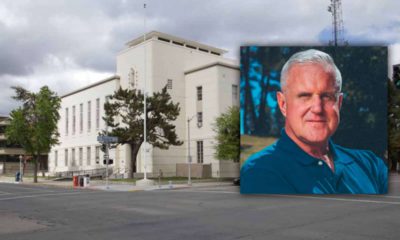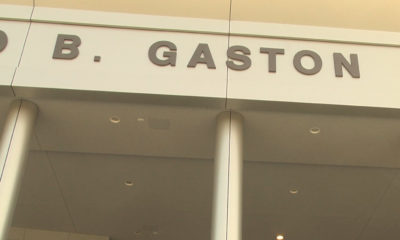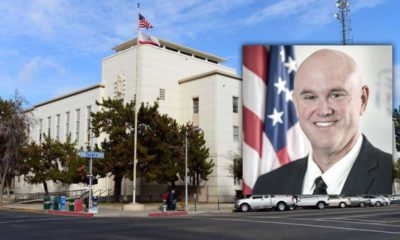Published
4 years agoon

When the Fresno Unified School Board holds its bi-monthly meetings, community members who want to comment on scheduled agenda or unscheduled items must submit their statements by voicemail or email by 8 p.m. the day before.
That appears to be a violation of California’s Brown Act, which mandates giving the public the opportunity to directly address board members about their actions, First Amendment Coalition executive director David Snyder tells GV Wire℠.
And if Fresno Unified were to wind up in court over the matter, Snyder believes it “very likely” that a judge would rule that the district is violating the Brown Act by not providing the opportunity for real-time, live comments during board meetings.
Fresno Unified, however, says it’s adhering to the Brown Act. In response to queries that GV Wire℠ sent to trustees this week about the board’s public commenting process, chief of staff David Chavez said that the district gives the public ample time to provide comments prior to meetings.
For example, he said, the agenda for Wednesday’s board meeting was posted online at 11:30 a.m. Oct. 9, which gave the public 11 days to submit comments.
Asked if the district’s lawyers have weighed in on whether Fresno Unified is adhering to the Brown Act when live public commenting is not allowed during the board meetings, Chavez said, “Legal counsel has been involved in our implementation of the Public Comment process from the beginning to ensure we were in compliance with all requirements.”
Of Fresno’s three largest school districts, only Fresno Unified does not provide the opportunity for public comment during the meetings. The school boards in Central Unified and Clovis Unified are meeting in person and provide the opportunity for in-person and phone commenting.
At Clovis Unified’s board meeting on Wednesday night, for example, trustees took phone calls from the public after a lengthy discussion by administrators and trustees about the district’s plan to reopen elementary schools.
Central returned to in-person meetings on Oct. 13 but previously allowed the public to call in and comment during its virtual board meetings.
Having the ability to speak directly to the school board, and also to respond to their actions, is key to representational democracy, which the Brown Act is designed to support, Snyder said. The First Amendment Coalition is a San Rafael-based nonprofit that focuses on open and accountable government.
Gov. Gavin Newsom’s emergency order N-29-20 in March permitted virtual public meetings under a temporary exemption to the Brown Act’s requirements. The goal was to slow the spread of the coronavirus.
But legislative bodies like school boards still need to allow for real-time, live commenting and feedback during meetings, Snyder said, calling it “one of the core rights of the Brown Act. … Agencies ought to be doing their level best to replicate public meetings as closely as possible.”
Fresno Unified initially allowed comments to be submitted a few hours before the start of board meetings but later moved the deadline to the day before.
But expecting the public to provide a comment or reaction before the board has even acted unreasonable and violates the spirit of the Brown Act, Snyder said.
Constituents should be able to look their elected officials in the eye — even if it’s on a computer screen — while addressing them, he said.
By turning off their cameras during meetings, as some Fresno Unified trustees have done, constituents are prevented from seeing trustees’ reactions that normally would be visible during a public meeting, he said.
It would be as if an elected official stepped behind a curtain or left the room while a member of the public was commenting during an in-person meeting, Snyder said.
“Few people would find that acceptable,” he said.
Enforcement of the Brown Act can come through action by a District Attorney’s Office, which can charge suspected offenders with misdemeanor offenses, or through a civil lawsuit, Snyder said.
Jerry Stanley, spokesman for the Fresno County District Attorney’s Office, said the office’s Public Integrity Unit has not received complaints about Fresno Unified’s current meeting process.
Fresno Unified could take another look at allowing real-time commenting from the public during board meetings, president Keshia Thomas told GV Wire℠: “I don’t see any reason why not.”
Nancy Price is a multimedia journalist for GV Wire. A longtime reporter and editor who has worked for newspapers in California, Florida, Alaska, Illinois and Kansas, Nancy joined GV Wire in July 2019. She previously worked as an assistant metro editor for 13 years at The Fresno Bee. Nancy earned her bachelor's and master's degrees in journalism at Northwestern University's Medill School of Journalism. Her hobbies include singing with the Fresno Master Chorale and volunteering with Fresno Filmworks. You can reach Nancy at 559-492-4087 or Send an Email



Trustee Slatic Calls for ‘Redshirt’ Year for High Schoolers When In-Person Classes Resume


Quinto Now in Malibu. FUSD Parting Pact Includes Year’s Pay, $39K in Retirement Contributions.


District Spends Over $1M Fighting Lawsuit That Could Refund Its School Construction Funds


Parents Get More Time to Weigh In on FUSD Return to School Options


Superintendent Looks to Shake Up Roles to Boost Fresno Student Performance


More Than 12,000 Students Chronically Absent This Year, District Says.




Eugene Alvarez
October 30, 2020 at 5:09 am
Of course the FUSD wants to control comments and questions. I have experienced this with California State University Fresno as Joseph Castro during his virtual meetings with students screening questions and comments.
This to me is transparency and un-American as Americans should be able not to be screened. We are supposed to have a “Checks and Balance” system.
Of course as administrators will lie to protect their ways of violating our freedoms in order to hide what they are doing.
Maybe their will be someone who will take FUSD to court.
I would love to be their to see David Chavez face when a judge says that FUSD is in violation. What will David Chavez say in response, the usually that a judge who is well versed in the law is wrong.